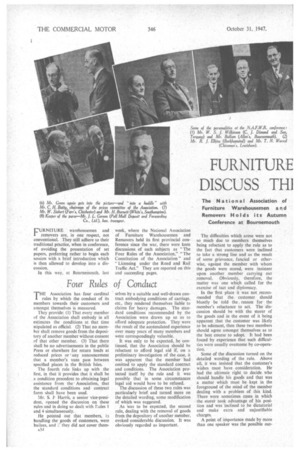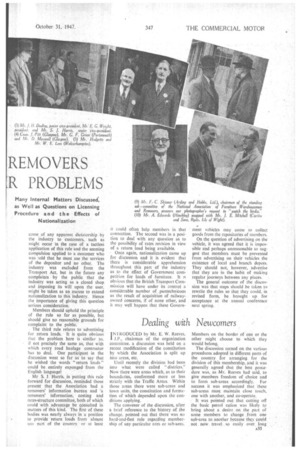FURNITURE REMOVERS DISCUSS THI R PROBLEMS
Page 44

Page 45

If you've noticed an error in this article please click here to report it so we can fix it.
FURNITURE warehousemen and I removers are, in one respect, not conventional. They still adhere to their traditional practice, when in conference, of avoiding the presentation of set papers, preferring rather to begin each session with a brief introduction which is then allowed to develop into a discussion.
In this way, at Bournemouth, last week, where the National Association of Furniture Warehousemen and Removers held its first provincial conference since the war, there were keen discussions of such subjects as "The Four Rules of the Association," "The Constitution of the Association" and " Licensing under the Road and Rail Traffic Act." They are reported on this and succeeding pages.
The difficulties which arose were not so much due to members themselves being reluctant to apply the rule as to the fact that customers were inclined to take a strong tine and as the result of some grievance, fancied or otherwise, against the member with whom the goods were stored, were insistent upon another member carrying ow removal. Obviously, therefore, the matter was one which called for the exercise of tact and diplomacy.
In the first place it was not recommended that thecustomer should bluntly be told the reason for the member's reluctance to act. The discussion should be with the storer of the goods and in the event of it being apparent that the customer was likely to be adamant, then these two members should agree amongst themselves as to the best course to adopt. It had been found by experience that such difficulties were usually overcome by co-operation.
Some of the discussion turned on the detailed wording of the rule. Above all, it was insisted that the customer's wishes must have consideration. He had the ultimate right to decide, who should handle his goods and that Was a matter which must be kept in the foreground of the mind of the member dealing with a problem of this kind. There were sometimes cases in which the storer took advantage of his position and was -inclined to be dictatorial and make extra anti unjustifiable charges.
A point of, importance made by more than one speaker was the possible out
come of any apparent dictatorship. by the industry to customers, Such as might occur in the case of a tactless application of this rule and the seeming compulsion applied to a customer who was told that he must use the services of the depositor and no other. The industry was excluded from the Transport Act, but in the future any complaints by the public that the industry was acting as a closed shop and imposing its will upon the user, might be taken as an excuse to extend nationalization to this industry. Hence the importance of giving this question serious consideration.
Members should uphold the principle of the rule so far as possible, but should give no reasonable grounds for complaint to the public.
The third rule relates to advertising for return loads. It is quite obvious that the problem here is similar to, if not precisely the same as, that with which every road haulage contractor has to deal. One participant in the discussion went so far as to. say that he wished the words "return loads" could be entirely expunged from the English language!
Mr S. J. Harris, in putting this rule forward for discussion, reminded those present that the Association• had a removers' information bureau and 'a removers' information, costing and rates-structure committee, both of which could with advantage be consulted in matters of this kind. The first of these bodies was nearly always in a position to provide return loads from almost iny nart of the country, or at least
it could often help members in that connection. The second was in a position to deal with any question as to the possibility of rates revision in view of a return load being available, • Once again, nationalization came up for discussion and it is evident that there is considerable apprehension throughout this part of the industry as to the effect of Government competition for loads of furniture. It is obvious that the British Transport Commission will have under its control a considerable number of .pantechnicons as the result of acquisition of railwayowned concerns, if of none other, and it may well happen that these Govern meat vehicles may come to collect goods from the repositories of members.
On the question of advertising on the vehicle, it was agreed that it is impossible and perhaps unreasonable to suggest that members must be prevented from advertising on their vehicles the existence of local and branch depots. They should not, however, advertise that they are in the habit of making regular journeys between any places.
The general outcome of the discussion was that steps should be taken to rewrite the rules so that they could, in revised form, be brought tip for acceptance at the annual conference next spring.












































































